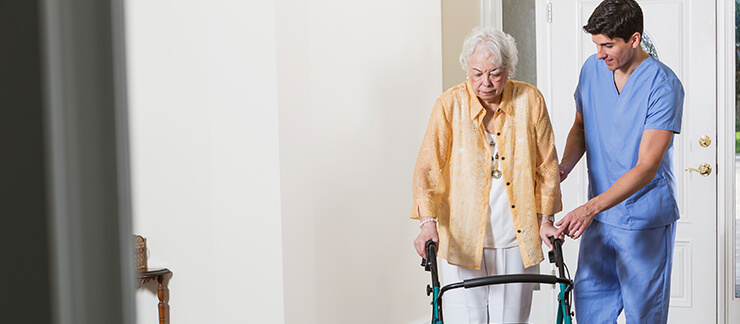
How Delaying Home Care May Be Costing More Than Money
Deborah Moffatt still remembers the day she was teaching her college course on caregiving and aging when an astute student asked her how she took care for herself.
As the primary caregiver to her aging mother, who lived with Moffatt and her husband for 15 years, the professor had to think about that question. Like so many family caregivers, if she was honest with herself, she knew the answer: She wasn't doing a very good job.
"I felt constantly exhausted,'' she said, adding that her mother was healthy and mostly active until she died just before her 90th birthday.
Moffatt is hardly alone.
Self-care, necessary to help alleviate the stress and strain of caring for a loved one, is among the much-overlooked casualties of family caregiving and a hidden cost of delaying professional home care.
"Caregiving fits the formula for chronic stress so well that it is used as a model for studying the health effects of chronic stress,'' according to a National Institute of Health (NIH) research paper.
While there is no doubt caring for an aging family member is tremendously rewarding and often strengthens relationships, it often creates financial, physical and emotional strain — with depression as a common side effect of caregiving.
Opting to care for a family member or delaying in-home professional care can also have a long-term financial impact on earning power and ultimately retirement savings, academic experts caution.
Hidden Financial Costs
The hard costs of caring for someone over the age of 50 is about $5,500 out of pocket, according to “Social Gerontology: A Multidisciplinary Perspective.” That is in addition to other direct health and medical costs that can vary widely.
Moffatt said she and her husband renovated their suburban home to accommodate it for her mother when she came to live with them fulltime. And she was lucky, she said, because her mother had the income to help offset other living expenses.
Moffatt said she was also lucky to have a job that was flexible and a husband who could telecommute for his job occasionally to be at home when she couldn’t be there.
That is hardly the case for most family caregivers, many of whom are juggling full-time work, children, a marriage and what’s left of their own social lives.
There are many short-term and long-term costs associated with working to balancing that all. Especially hard-hit are women, who are often the primary caregiver and who live longer than men.
Women who become caregivers for an elderly parent or friend are more than twice as likely to end up living in poverty than if they aren't caregivers, according to Women's Institute for Secure Retirement (WISER).
That's because when they take time off work they lose wages, which has long-term impacts on Social Security, pension payouts, 401K earning and other retirement savings. That can add up over time to hundreds of thousands of dollars.
There’s also a cost to employers as well, some of which is passed on to consumers. More than 80 percent of family caregivers reported they went to work later or left their jobs early to care for relatives. Another 40 percent moved from full-time jobs to part-time work.
Physical Toll On Caregivers
Studies found time and time again those caring for older or sick relatives have a higher incidence of sickness themselves.
Such health problems include headaches, pain, arthritis, back pain, sleep disorders, elevated blood pressure and increased risk of heart disease. Other health problems include weight changes, an inappropriate use of prescription drugs and comprised immune systems, leading to an increase in common colds or other viruses.
Caring for a person with dementia causes even more severe negative health effects than other types of caregiving, per the NIH report.
Moffatt said she rarely thinks in terms of dollars when she thinks of the cost of a caregiver.
“Not having companion care or access to helpful resources creates stress on caregivers and the elder family member,’’ she said.
Masked Emotional Costs
Commonly referred to as compassion fatigue, family caregivers often report worry, anxiety and feeling overwhelmed. These stressors, according to Nancy Hooyman’s "Social Gerontology," increase with the more difficult the care and the longer a family member provides care.
Hooyman's text cites multiple research studies that estimate 40 to 70 percent of caregivers have symptoms of clinical depression.
Even professor Moffatt, who uses Hooyman's textbook and has been teaching aging courses for 17 years, said she sometimes felt overwhelmed and tired.
It was one reason she hired an in-home caregiver for her mother twice a week in the last three years of her mom's life.
That professional caregiver eased her stress and strain. She was there when neither she nor her husband could be. She played games and took walks with her mom, helped her run errands like getting her haircut and reminded her to take her medication. They often ate lunch together.
And when her mother died, the caregiver attended her funeral services. That reinforced for Moffatt that a caring relationship that had formed between the caregiver and her mother.
"Hiring a professional caregiver was one of the best decisions I ever made,'' Moffatt said.


